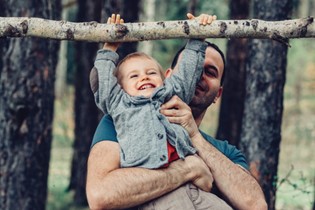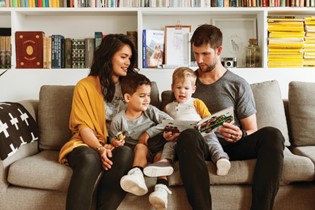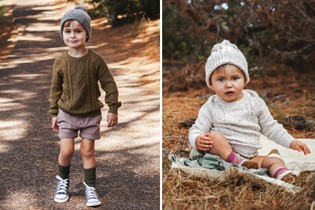How community connection can boost your parenting skills

Parents need all the help we can get! Psychologist Chantal Hofstee shares her tips for building your much-needed tribe.
Who hasn’t heard the phrase “It takes a village to raise a child”? This African saying is often used to describe how each child needs a group of people to help look after them, teach them and to be a valuable part of their life. However, less cited is the second half of the saying: “…and a community to keep the parents sane”.
‘Tribal’ parenting seems to have become the exception in the West. Many of us live far away from our family, hometowns and cultural norms. Family members are likely to be in paid work and not available to help out, so many parents feel overwhelmed and struggle with feelings of isolation. To resolve this we need to get creative, to think outside the box and to find our modern day ‘parenting tribe’.
In other parts of the globe, parenting is often a family, or even a neighbourhood, affair. In many Middle Eastern and African countries a lot of parenting happens in the streets. Older people spend a lot of time sitting outside drinking tea and discussing the latest news and gossip. As the kids play outside, often until late at night, their neighbours, uncles, aunties and even the corner grocer all play a part in keeping an eye on them, and are given licence to dish out discipline when needed. These children grow up with an extended network of people who are available for ‘supervision’ and connection, taking some pressure off the parent(s).
MY VILLAGE
I was lucky enough to experience ‘the village’ in my own childhood. I grew up with my aunt, uncle and grandparents living around the corner. On Monday afternoons I’d often spend some time at my uncle’s cafe or my aunt’s shop until mum finished work. I’d often draw, and if my aunt and uncle weren’t busy with customers, I’d talk to them about my day. Sometimes I’d visit the shop next door to talk to the old shoemaker. The weekends would often be spent at my grandparents’ house; drinking tea with my grandmother, helping my grandfather in the garden, or visiting their neighbours to pet their horse and drink more tea! I felt as at-home in their houses as I did in my own – sometimes even more. They had time for me and all my questions, they told me stories and taught me things. They clearly enjoyed my company and simply loved on me.

LIFE'S 'RUSH HOUR'
My extended family were part of the village that raised me, and they were the community that kept my parents sane in those years that are sometimes referred to as ‘the rush hour of life’. As a child, I thought that my aunt, uncle and grandparents were amazing, loving and attentive. Now, as a parent myself, I can see why my parents seemed less mindful, patient and available than my other family members. I understand how the experience of having a grandchild or two for the weekend or afternoon is very different from having three children in your care while also working during ‘the rush hour of life’.
Now I’m in that rush hour, and it can be relentless dealing with pre-dawn wake-ups, emotional outbursts, constant discussions over nonsense and numerous trips back upstairs after lights-out because ‘Mum, I can’t get to sleep’. And then there’s the responsibility of keeping them all clean, dressed, fed and well-behaved. Part two of the saying above rings true, but where do I find this community?
WHERE'S MY TRIBE?
What’s happened to our parenting communities? Where have our villages and tribes gone? And is their disappearance why so many parents I know struggle with feeling isolated and overwhelmed? It makes perfect sense when you consider the bigger picture. Traditionally, family members were much more likely to live in close proximity to each other, which makes ‘tribal’ parenting much more practical and more likely to happen. Cultural norms and expectations also play a role. In many cultures it is common practice for the working-age people to live with and offer financial support to the older generation. In return, the older generation plays a big role in child-rearing. In some Asian cultures it’s even common for grandmothers to breastfeed their grandchildren, and in parts of Africa, parents often send a misbehaving child to live with another family member for up to several years to help keep them away from bad influences and to give the parents a break. Living with your in-laws or having your mother breastfeed your child might not sound appealing, but it’s easy to see how these traditions support parents when they’re at their most vulnerable.
So, living away from our tribes and cultural norms helps explain the lack of community parenting, but that’s only part of the problem. The increased demands of modern-day living also doubles a parent’s load.
THE PRESSURES OF MODERN-DAY PARENTING
As well as school, there are also activities, such as sports, music lessons, swimming lessons and tutoring, to fit in to our days. We don’t want our kids to miss out on opportunities, but without that village to share the load, all those opportunities can also lead to overwhelmed and unhappy parents. Even playing with friends mostly happens in well-planned and organised play dates which require chauffeuring and catering, not to mention entertainment. Gone are the days of kids roaming the streets so mum could get on with the housework! So I ask myself, ‘Why do I not send my six-year-old out on the street to go and find some friends to play with?’ The answer is because so much could go wrong. What if he gets lost? What if he gets kidnapped? What if he gets hurt? How does he even come across other neighbourhood kids – they don’t play in the streets either! Yep, as much as I hate to admit it, I’m a helicopter parent and end up playing ball with my six-year-old safely behind our gate.
I know there are exceptions – the parents who absolutely love playing ball with their child after a long day at work or driving them to three ballet practices a week, who easily handle the broken sleeps and the seemingly endless cleaning up of poo and pee … but most mums I know struggle. It makes sense that they do because in no other culture in the world do we find a parenting structure where almost all the care falls on one or two parents. Yet, even in the West, it’s actually a fairly recent development. Much has changed, even since I was a child. Not only do parents feel more on their own, but the list of what we feel our children ‘need’ has increased, creating a double-whammy of less support but more demands. Sounds like a true recipe for burned-out parents.
FIND YOUR ALT-VILLAGE
So what can we do? A great place to start is to realise that we don’t have to do it all. For me, this includes the realisation that the full-time stay-at-home-parent ideal is also a very recent concept. In most cultures women have always worked, whether it was on the farm, in the family store, in schools, in health or elder care. It may not always have been formal paid work, but they worked nonetheless. And they could because there were other women around to help look after their kids. For many women, these responsibilities outside of childcare add a sense of fulfilment to everyday life, widen social circles and also give you a break from your kids! This is how it’s been for much of time, in most places around the world. So, according to my logic, that is probably the best system for both the parent and the child. This realisation helped me get over the guilty feeling that my children needed me all the time, and helped me see that what they really need is a healthy parenting system that includes me, my husband, our family, friends, neighbours, teachers and coaches. In this day and age, that system can often translate into paid help so, because my children’s grandparents live on the other side of the world, we’re actively seeking out home-based care so our littlest will have a grandmother figure in her life. We chose our son’s sports club based on the family environment that they fostered and how the coaches engaged with the kids. We actively build relationships with our immediate neighbours and ask if our kids can pop over for little visits on their own every now and then.
Also, when I’m feeling stressed and overwhelmed and just need a break, I reach out to people to ask if one of my kids can come around for a visit. Sometimes this is one of our neighbours, sometimes a mum friend or sometimes we hire a babysitter so my husband and I can go out for a nice meal to reconnect and recharge. As it turns out, even though people are busy, they’re still happy to help. The neighbours enjoy the visits by our little people, the mum friend loves how she can then ask for the same favour when she needs it and the babysitter enjoys the extra pocket money. It’s a win-win-win. Yes, there are practical barriers to overcome that weren’t there 50 years ago, but the biggest barrier is often our own hesitation in reaching out to people who could become our community. Once we get past that it gets easier, and we can really begin to actively share the load – and give ourselves a break.

LOVE THY NEIGHBOUR
After actively pursuing this type of community for some time, our children now have great relationships with certain neighbours. Our four-year-old daughter and the old lady next door search for snails together in her backyard, while our son will often pop over to the other neighbours to play with their three-year-old and his collection of toy cars. It turns out that our kids have wonderful conversations with our neighbours – not unlike those I used to have with my aunt, uncle and grandparents. Plus, it’s amazing what a 20-minute break can do for me when I know the kids are happily playing next door and I can do a quick tidy-up of the house or perhaps just sit down with a refreshing cup of tea.
Realising that this parenting gig doesn’t just rely on my husband and me, and that a healthy connection to a group of available adults, even if some of these are paid, really has taken a load off my shoulders. I don’t feel selfish or like a bad parent when I ship them off to people I know and trust; I’m giving them the village they need to thrive and myself the community that helps me stay sane in the ‘rush hour of life’.
|
TIPS TO BUILD YOUR OWN TRUSTY TRIBE ✔ Actively build relationships with your neighbours, including those who don’t have kids. ✔ Don’t be afraid to ask for help. People don’t know what you need if you don’t tell them. ✔ When choosing childcare and extra-curricular activities, opt for small-scale with consistent teachers/mentors where possible. ✔ Offering your help to others makes it easier to ask for their help when you need it. |
Chantal Hofstee is a clinical psychologist, executive coach and a very grateful mum of three little ones. She is also the author of Renew Your Mind and Reach Your Goals Without Stressing Out. Find out more at renewyourmind.co.nz.

AS FEATURED IN ISSUE 49 OF OHbaby! MAGAZINE. CHECK OUT OTHER ARTICLES IN THIS ISSUE BELOW

















